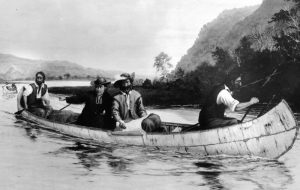Marquette and Jolliet: 350 Years of Changing Evaluations

Jacques Marquette and Louis Jolliet are celebrities of Midwestern history. Cities and schools are named in their honor and their likenesses appear in art and architecture around the United States. This year marks the 350th anniversary of the event for which Marquette and Jolliet are famous: a canoe voyage down the Mississippi River with five voyageurs in 1673. The anniversary is being widely publicized. My hometown of Prairie du Chien, Wisconsin, near where the French first entered the Mississippi, is celebrating the event with a carnival. From these commemorations, it might seem that Marquette and Jolliet have always been figures of great historical importance — but the cultural significance of their canoe trip has shifted greatly over the last three and half centuries.
The Debated Claim of “Discovery”
Like other children in my predominantly white hometown, I was told while growing up that Marquette and Jolliet were important because they “discovered” the Mississippi River in 1673. Already by high school, I learned that this was not quite accurate — but not because it neglected the Indigenous nations who had already known the Mississippi for thousands of years. Instead, I learned that the Spaniard Hernando De Soto had “discovered” the Lower Mississippi in 1541, and that other French men, such as Radisson and Groseilliers, had perhaps already seen the Upper Mississippi in the 1650s. Regardless, Marquette and Jolliet were to be commended for making the first written account of the river’s course.
Only as a college undergraduate did I read Marquette’s journal and begin to understand that Marquette and Jolliet were guided and supplied by Native American allies on their journey, traveling water routes that were long established by Menominee, Illiniwek, Quapaw, and other Indigenous nations. Marquette’s account of the voyage makes clear that the travelers not only relied on Indigenous knowledge, but also saw meeting with the people who lived along the Mississippi as the main purpose of their journey. They did not set out to map an empty land — in fact, they set out with a map already started based on reports from Illiniwek people. Marquette and Jolliet traveled to lands that they knew were inhabited because they sought to draw new people into the colonial orbit of France and the Catholic Church. Meeting people was so central to the journey that Marquette could write that the expedition “advanced over 60 leagues since we entered the river, without discovering anything” — until they finally reached the Peoria village of the Illiniwek a week after entering the Mississippi.
Today’s media reports on the 350th anniversary of Marquette and Jolliet’s voyage are making an overdue effort to recognize the centrality of Indigenous people in the expedition, as well as the legacy that the journey had in furthering the European colonization of Indigenous homelands. As Indigenous studies professor Margaret Huettl explained in a discussion with Wisconsin Public Radio, the explorers traveled through “a thriving network of Indigenous economies, politics, and social communities.” Children today hopefully don’t have to reach college before understanding that the 1673 expedition was a meeting of cultures where Europeans followed in the footsteps of Indigenous guides rather than treading new, unbroken ground. At the same time, in commemorating the explorers, today’s reports still dance awkwardly around the notion of “discovery,” acknowledging that the word is misplaced, but struggling to articulate an alternative reason for Marquette and Jolliet’s ongoing significance.
Continue reading →